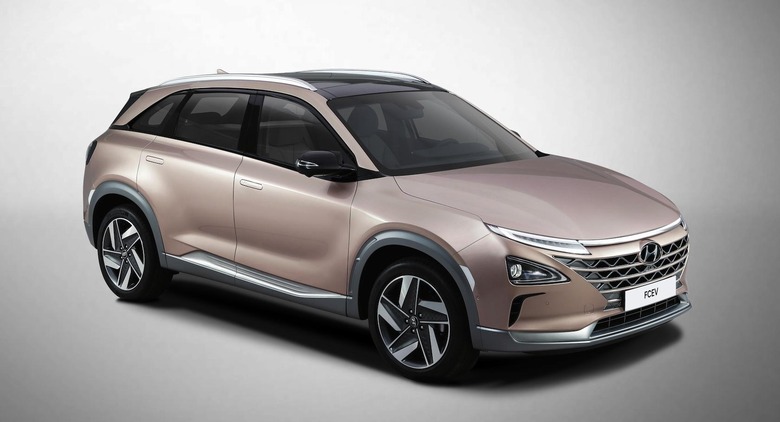Hyundai's 2021 Autonomous Car Roadmap Starts With This Fuel-Cell SUV
Hyundai is bringing its new fuel-cell powered SUV to CES 2018, the first test model for its Level 4 autonomous car plans. The EV – the official name of which will be confirmed in Las Vegas next week – will form the basis for a partnership between Hyundai and driverless tech firm Aurora, which together aim to have an autonomous vehicle on the market by 2021.
The hydrogen powered car will be a test-bed for numerous new technologies the automaker has in the pipeline. In addition to the fuel-cell drivetrain – which will emit only water as a waste product, rather than carbon dioxide and other greenhouse gases – it will preview the so-called Intelligent Personal Cockpit. That's Hyundai's vision of how artificial intelligence (AI), voice recognition, and an ability to track the driver's vital signs could make for a more rewarding car.
Of all the tech, though, it's probably the attempt to oust the driver from their spot behind the steering wheel that's most intriguing. Initially, Hyundai and Aurora will work on custom-designed vehicles that will act as real-world test suites for Level 4 automation. That will mean the ability to do without human operation in most – though not all – conditions.

Those cars will be deployed in select pilot cities for test programs, ahead of a longer-term goal to commercialize the technology. It's not the automaker's first autonomous move, mind. It began public road trials in Nevada in 2015, before expanding last year to encompass more challenging urban environments.
Most recently, Hyundai has been using the IONIQ for its driverless test mules. Indeed, back in 2016 we took the autonomous IONIQ for a spin – or, more accurately, it took us – around the Las Vegas strip. The new hydrogen fuel-cell SUV, however, will be more suited to the task, the automaker says, as its energy system will be capable of supplying "a massive amount of power to support the large amount of data communication as well as the operation of hardware such as sensors" in the car.
That's not the only use Hyundai has envisaged for all that hydrogen-generated power, mind. Back when it took the wraps off its fuel-cell concept in March last year, the curvaceous SUV had a surprise of its own in the trunk. Not a computer for managing autonomous driving, no, but an electric scooter that would be kept charged up by the fuel-cell.
